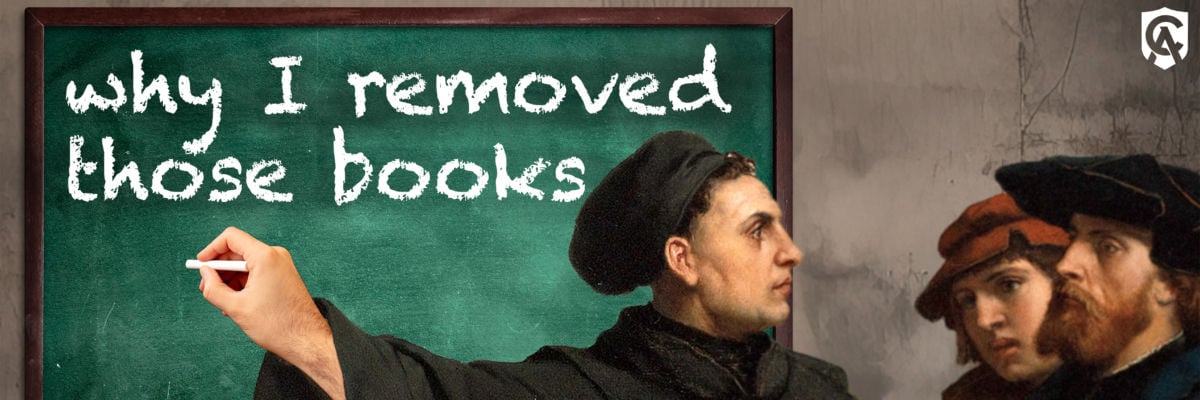
Jimmy Akin explores Luther’s decision to exclude these books from the Protestant canon, delving into historical context, Luther’s potential motivations, and the role of the Holy Spirit in shaping the canon.
Transcript:
Hi, thank you. The question is, do we know Luther’s motivation for declaring the Deuterocannon a powerful and what’s he the first reformer to do that? And then why are the other books that are sub-tuigent not included in our canon today?
I think you asked about three questions there. Let’s see if I can take them one at a time. One you asked was Luther the first reformer to do this? And the answer is yes, because Luther was the first Protestant reformer. So by definition, he was the first one to do it. That is not to say, though, that there weren’t people who were prior to the Reformation that anticipated his position on the Deuterocanonicals. There were here and there individuals who questioned whether or not the Deuterocanonicals should be counted as Scripture. The majority position and the church’s official position was that they were Scripture, but this hadn’t yet been infallibly defined. And so you would find individuals here and there that disagreed with that. In terms of what was Luther’s motivation for doing this,
that can be answered a number of ways. I always like to start with the reasons that people themselves give for what they did. Now, in order to speak in a comprehensive way to this, I’d have to do some further research into what Luther said. And I’ve actually got his writings, but it’s a set of 30-something dense volumes, and I haven’t done the research to give you a definitive answer on that. But if memory serves, Luther appealed to a couple of things in his criteria for excluding the Deuterocanonicals. The first one was the European Jews that Luther was aware of did not have these books in their Bibles. And so the argument, and this is an argument that’s still used by Protestants today. You know, Paul says in Romans, the Jews to the Jews were committed the oracles of God, and the Jews that they were aware of in medieval and Reformation-era Europe didn’t have these in their Bibles. And so they concluded that, well, they must not belong in the Bible because the Jews are the stewards of the oracles of God. There are problems with that. One of them is that there are other Jews who belong to different intellectual traditions within Judaism than the ones that were found in medieval Europe. And some of them did honor the Deuterocanonicals. So you can’t just say, well, these Jews that I know about represent all Jews when in fact they don’t. And other Jews did accept the Deuterocanonicals. In fact, there’s actually a group of Ethiopian Jews today known as the Falashas who do honor the Deuterocanonicals.
So they’re being selective about which groups of Jews they were listening to. Another problem with this view is that even the canonical tradition that was used by medieval and Renaissance-era European Jews didn’t solidify until well after the time of Christ. There continued to be books that were debated into like the 200s and 300s and maybe 400s in Jewish circles. And so it wasn’t like they had a solid agreed-upon canon in the day of Jesus. This is something that would continue to be debated for centuries after the time of Christ. And anything that happens centuries after the time of Christ is something that Christians really shouldn’t be relying upon as authoritative for us. Because what’s authoritative for us is what was handed down from Jesus and the apostles, not what some Jews did centuries later. So we need to look to Jesus and the apostles to tell us what the canon is. And when we do that, we find that they relied upon the Septuagint edition of the Old Testament when they wrote the New Testament, depending on how you count between 80 and 90 percent of the time that the New Testament quotes the Old Testament, it’s quoting from the Septuagint. And so they clearly regarded the Septuagint as a good translation of the scriptures, and it includes the Deuterocanonicals, which is why the majority opinion in Christian circles was always in favor of the Deuterocanonicals. And that leads to your third question, which is why there are certain additional books in the Septuagint that are not considered canonical in Catholic circles. Some of them, not all of them, are considered canonical in Eastern Orthodox circles, but not all of them. There are some books from the Septuagint Greek translation of the Old Testament that Orthodox agreed, “Oh yeah, that’s not canonical.” And this leads to the action of the Holy Spirit in helping us discern the canon, because that’s what’s ultimately important. Well, the Holy Spirit led the church to recognize broadly the Septuagint as scripture, but not every book of the Septuagint. And Catholics would say, “Well, the Holy Spirit led us to recognize the proto-canonical and the Deuterocanonical books of the Septuagint as scripture, but not those extra few like third and fourth Maccabees.” And the Eastern Orthodox would say, “Well, yeah, the Holy Spirit did the same thing for us, except he led us to also include third and fourth Maccabees or third Maccabees at any rate. I’d have to check their exact canon list, but not these other few.” And so, you know, what you hold to as canonical is going to depend on which church you belong to and which canonical tradition you honor. An interesting question concerns what would happen if we and the Eastern Orthodox reunited. One of the things that I strongly suspect would happen is we would say, “Okay, the issue of the exact border of these books did not divide us before the separation, and so it doesn’t need to divide us now.” In fact, I was reading just yesterday a quotation from Joseph Radzinger, where he said that in order to reunite with the Orthodox, we shouldn’t require more of them than what they believed before the separation, and they should not regard anything that’s happened in Catholicism since the separation is heretical. So we’d have a situation where within the Catholic Church, you have two opinions. Applying that to the canon, you would have one opinion in the Western Church that, “Okay, the proto-canonicals and the seven deuterocanonicals that Catholics accept are Scripture, and within the reunited Eastern Orthodox Churches, you would have the opinion that the proto-canonicals and the seven plus books that are deuterocanonical that they accept are Scripture, and these two views could live alongside each other without a problem.”
Let a few centuries go by, the Church might decide to revisit the question and hypothetically could accept those books, but we’re getting into pretty speculative territory here.
Hey, thanks for watching. If you like this Catholic answer, be sure to like, subscribe, and check out our live streams Monday through Friday, 3 to 5 p.m. Pacific, or find the episode after on YouTube, your favorite podcast platform, or our Catholic Answers app.



